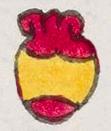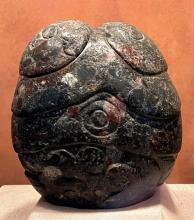yollotl (Mdz16v)
This element for yollotl (heart) has been carved from the compound glyph for the place name, Yolloxonecuilli. The heart is upright, red at the top and bottom, and it has a yellow horizontal band across the middle with a somewhat scalloped shape. The heart also has curling elements at the top.
Stephanie Wood
While this image may stand for more than the literal, physical human heart, the visual is just that. This heart is also quite similar to the one on folio 65 recto of the Codex Mendoza. The coloring of the heart is reminiscent of the colors that have been used for showing points of access to the inside of the human body, such as we see at the site of the acolli (shoulder) in Acolhuacan, where the bone protrudes and liquid emerges. Another example can be found in the place name Ixicayan, where water oozes from the red and yellow lines at the base of the tepetl (hill, mountain), which may suggest a similar way to thinking about access points to the interior of the earth.
Stephanie Wood
c. 1541, or by 1553 at the latest
Stephanie Wood
hearts, corazones, organs
yollotl, green stone. Museo Nacional de Antropología e Historia. Photograph by Stephanie Wood, 14 February 2023.

yollo(tl), heart, life, spirits, https://nahuatl.wired-humanities.org/content/yollotl
el corazón, la vida, el espíritu
Stephanie Wood
Codex Mendoza, folio 16 verso, https://digital.bodleian.ox.ac.uk/objects/2fea788e-2aa2-4f08-b6d9-648c00..., image 43 of 188.
Original manuscript is held by the Bodleian Libraries, University of Oxford, MS. Arch. Selden. A. 1; used here with the UK Creative Commons, “Attribution-NonCommercial-ShareAlike 3.0 License” (CC-BY-NC-SA 3.0)








